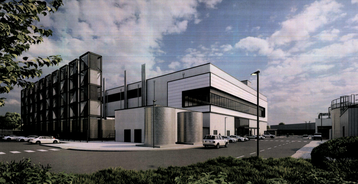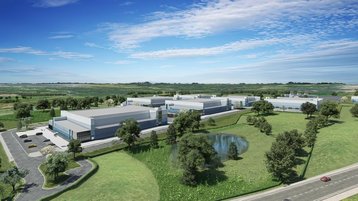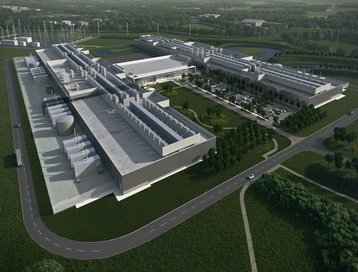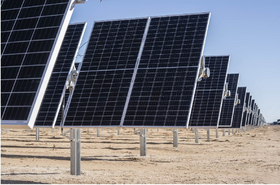AWS is reportedly restricting the number of resources users can access in Ireland amid ongoing concerns about the amount of power consumed by the nation’s data centers.
Amazon’s cloud platform is periodically limiting access to its Ireland-based eu-west-1 region, according to a report in The Register. Energy-intensive instances, such as those where GPUs are deployed to run AI workloads, are said to be particularly impacted by the restrictions.
The Register quotes an affected AWS user, who said: "You cannot spin up GPU nodes in AWS Dublin as those locations are maxed out power-wise.”
They added: “There is reserved capacity for EC2 just in case. If you have a problem with that, AWS Europe will point you at spare capacity in Sweden and other parts of the EU."
DCD has contacted AWS for comment on the report, but a spokesperson for the company told The Register: "Ireland remains core to our global infrastructure strategy, and we will continue to work with customers to understand their needs and help them to scale and grow their business.”
The publication also quotes a spokesperson for EirGrid, Ireland’s power network, who said the company sometimes limits supply to what it terms “large energy users” including data center operators.
"EirGrid is responsible for the safe and secure operation of Ireland's electricity transmission system,” the spokesperson said. “As part of its role, EirGrid supplies electricity directly to large energy users, which includes larger data centers connected directly to the transmission system.
"EirGrid may from time to time request large energy users to reduce their energy use as part of our demand side management.”
Ireland’s data center conundrum
Ireland is home to more than 80 data centers and is one of Europe’s most active markets. Amazon alone has multiple campuses in Dublin, including at the Clonshaugh Business and Technology Park, in Fingal County’s Blanchardstown, and one further south in Tallaght. Last year it received planning permission for three new data centers at its existing site in Cruiserath Road, Dublin.
But while data centers have brought significant economic benefits to Ireland, there is growing concern about the amount of power they consume and their impact on the country’s grid.
Figures published last year by Ireland’s Central Statistics Office showed that data center power consumption in the country increased by 31 percent in 2022, accounting for 18 percent of all electricity used in Ireland. A report from the International Energy Agency, released earlier this year, said data centers could gobble up 32 percent of Ireland’s power by 2026 due to the number of new builds planned.
Speaking to DCD after the IEA report was released, Mark Yeeles, vice president of the secure power division at Schneider Electric UK and Ireland, said "immediate, sustainable action" was required to avoid a power crisis in Ireland.
Yeeles said government and industry must “collaborate more closely, and combine existing technologies with innovative engineering to future-proof the country’s energy, economic, and technological outlook."
In 2022 EirGrid placed a moratorium on new data centers in the Dublin area that is set to last until 2028, but politicians have insisted they have no plans to limit future developments nationwide. However, last month the Irish Times reported that Ireland’s minister for the environment, Eamon Ryan, clashed with the government's minister for enterprise, Simon Coveney, during the cabinet meeting that discussed the data center industry. Ryan is reportedly keen to limit new data center developments that don’t utilize carbon-neutral power sources.
Ennis data center campus gets green light on appeal
As discussions continue about the future of Ireland’s data center industry, new developments continue to progress, and on Tuesday a €1.2 billion, 200MW campus planned for County Clare was given the go-ahead despite environmental concerns.
The Ennis data center campus will comprise six data halls spread across more than 145 acres (1.3 million sq ft) of land on Tulla Road, outside the town of Ennis. It will be developed by Art Data Centres.
First proposed in 2019, the development has been mired in controversy, with environmentalists describing it as a “climate disaster waiting to happen”. Planning permission was initially granted in 2022, but eight appeals were lodged against the decision. One of the appellants, Ireland’s national trust An Taisce, said in its filing that the development would generate 657,000 tonnes of CO2 each year due to its high power requirements.
An Bord Pleanála, Ireland’s independent planning authority, has been looking at the application for the last 18 months, and on Tuesday gave it the go-ahead, noting the importance of data centers to the Irish government’s economic strategy.
Art Data Centres said that 400-450 permanent jobs would be created at the campus, as well as 1,200 construction jobs during the build. Work is expected to commence later this year.
Meta brings diesel generators to ‘sustainable’ data center
Elsewhere in Ireland, Meta has been granted permission to install diesel backup generators at its data center in Clonee.
Facebook’s parent company has previously trumpeted the sustainability credentials of the facility, which it says is completely powered by renewable energy. It achieves this via power purchase agreements (PPAs), or buying renewable energy to put back into the grid and offset its emissions, and last year inked two new PPAs to procure energy from solar farms in Meath and Wexford.
However, in the event of a power cut, the data center will now be run on fossil fuels. Meta has been given a special license to run 90 diesel generators on the site. They will provide up to 734MW of power in the event of an emergency, and the license allows Meta to run the generators for up to 500 hours a year.
However, Business Post reports that Ireland’s Environmental Protection Agency, which granted the license, has stipulated that Meta must examine how it can use sustainable alternatives to “decrease or offset the use of fossil-fuel based energy at the installation,” so further PPAs could be in the pipeline.
DCD has approached Meta for comment.








